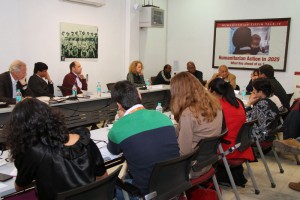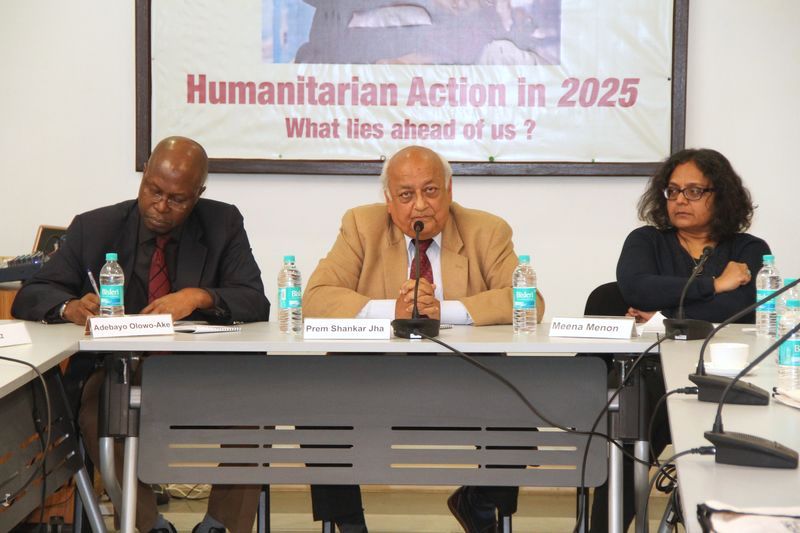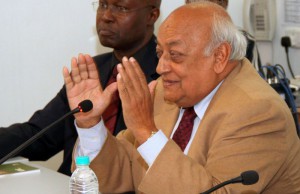This was precisely the question posed to participants at the Fourth in the Tiffin Talk Series organised by the New Delhi Delegation of the International Committee of the Red Cross (also covering Bhutan and the Maldives) held on Wednesday March 4 2015.
A packed hall, largely made up of a specialised audience from the humanitarian community, the diplomatic corps, academia, the media, students etc. listened to a panel that discussed the topic. It was chaired by Meena Menon, renowned Indian journalist, and had as speakers Prem Shankar Jha, former Special Adviser to the Prime Minister of India, well-respected Indian opinion leader and irrepressible media practitioner; and Adebayo Olowo-Ake, Communications Coordinator, ICRC Delhi.
Prem Shankar Jha, the main speaker, led the discussion with an incisive analysis of global trends, development in the international arena and its impact on the humanitarian situation. His discourse was largely split into four, namely, that humanitarian aid was apparently better delivered to beneficiaries in the days when the world often witnessed classical armed conflicts that were dominated by organised forces; secondly, that the current threat to the safe conduct of humanitarian missions (and concurrent threats to the lives of humanitarian professionals) is rooted in a weakened international security system; thirdly, that the increased desire for regime change by major players in the international system is largely responsible for the spate of exacerbated conflicts ravaging the world, which also complicates humanitarian missions; and fourthly, that humanitarian action in future might become too expensive to undertake due to the likely utilisation of high tech equipment, devices and platforms to surmount problems of access and safety of the mission.
Responding, Adebayo suggested that the recourse to asymmetrical warfare by non-state armed groups and the growing trend to do so, with a doctrine which often seeks the elimination of persons or groups opposed to the ideology of these non-State armed groups, rather than capture and administer territory they inhabit (unlike in classical armed conflict involving organised armed forces) has become a serious threat to the humanitarian mission. He averred that the lack of capacity by States to deploy pacific instruments (peacemaking, peacekeeping etc.) to such places owing to the brutality of these groups further hampers the humanitarian mission.
He submitted further that in the future (2025 and beyond), humanitarian organisations will have to find innovative ways to assess needs, access and deliver humanitarian assistance (some of which is being adopted already) using satellites for assessment and unmanned aerial vehicles for delivery. This is if they are able to reach some areas where assistance is required, given the emerging trend which suggests that accessibility might be significantly hindered, requiring them to outsource their service. Beneficiaries will also have a greater say in how their needs are met by humanitarian organisations, including deciding which humanitarian agency they would like to be served by, assessing the quality of aid provided and determining its impact.

The diverse audience included the humanitarian community, the diplomatic corps, academia, the media, students, etc. Ashish Bhatia/©ICRC
While throwing the floor open for contributions, Meena Menon, Chair of the session, highlighted the paradox in which humanitarian assistance could in future be outsourced when in reality the speakers had highlighted the possibility that there would be no access. A participant disagreed with the position earlier expressed that massive bombing of cities hinders humanitarian intervention, citing examples from the Second World War where, despite the massive bombing of London and Dresden, humanitarian missions still operated. Another participant wondered if there would be a shift in the traditional recipients of aid (for instance, would the north replace the south as recipients)? Lastly, a participant wanted to know if there would be any parallels between humanitarian action and development action. The speakers responded to these posers in what became a healthy intellectual and professional exchange.
Closing the session, Mary Werntz, Head of Regional Delegation of the ICRC in Delhi, identified with the challenges enunciated by the speakers and informed the audience that the entire humanitarian community is working hard at projecting the types of scenarios that could emerge in the near future and that the Tiffin Talk was a modest contribution towards that effort. She expressed the appreciation of the delegation to all guests and challenged colleagues in the humanitarian domain to generate issues from their points of view for which the Tiffin Talk could be a good platform to debate or address them with a view to finding answers.
ICRC New Delhi



